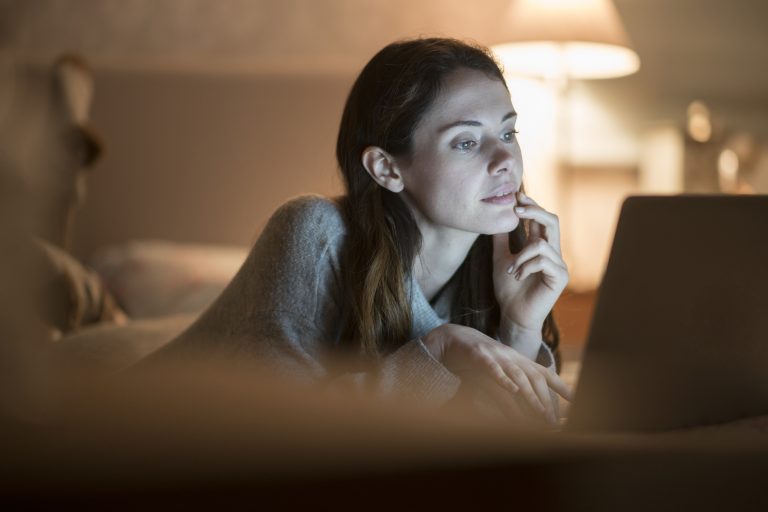
Whether in the office, at a series marathon or on social media, we spend a lot of screen time in everyday life. Blue light has long been suspected of promoting premature skin aging. But how harmful is the light from the screen to the skin? STYLEBOOK explains.
After getting up, check your social channels first, then spend eight hours in the office looking at your laptop and end the evening comfortably in front of the television. We often spend more time in front of screens than we would like during the day and this can take a toll on our skin from harmful HEV light.
What is Blue Light?
When it comes to blue light, a distinction must be made between natural and artificially generated blue light. Natural blue light, also known as high-energy visible light (HEVIS light for short), is part of solar radiation together with UV radiation. There is also the artificially generated bluish light emitted by smartphones, tablets, laptops and televisions. This is also referred to as HEV light. While the harmful effects of natural blue light on the skin have already been scientifically proven, there are still no long-term studies on the subject of artificial blue light. So how harmful is screen light to your skin?
Also interesting: Does hair really need extra sun protection?
How harmful is the light from the screen to my skin?
Berlin dermatologist Dr. Yael Adler explains: “Very intense exposure can cause damage to the skin. Substances such as free radicals are formed, which can promote skin aging when working on screens”. Overall, the consequences are comparable to those of solar radiation, but significantly attenuated. “However, visible cellular damage can occur in the mitochondria, i.e. in cell metabolism, cell renewal and cell repair, which, for example, promote the development of wrinkles,” emphasizes the dermatologist. Studies have also shown that blue light can affect inflammation and the skin barrier. This can accelerate skin aging, as the expert explains.
The Beiersdorf research team around Dr. Ludger Kolbe in a study, however, came to the conclusion that artificial blue light is not as harmful as previously thought. “As part of our research activities, we have been able to demonstrate that the radiation dose of artificial blue light resulting from the conventional use of electronic devices is far from sufficient to have a harmful effect on the skin,” says the Press release. “Artificial blue light emissions are virtually undetectable compared to natural blue light emissions from solar radiation,” he continues.
Natural blue light poses a greater danger
However, that doesn’t mean that artificial blue light is completely harmless to your skin. The study only points out that the much greater danger comes from natural blue light. The study states that the HEV light intensity of 172 hours in front of the monitor (at a distance of 30cm) corresponds to one minute on a sunny day in midsummer. Sunscreen is therefore an absolute must for your daily beauty routine – this is the only way to adequately protect yourself from natural blue light and prevent premature skin ageing.
Protect your skin from artificial blue light
Put on a digital detox
A digital detox can be a welcome change not only for the soul, but for the skin as well. Even though the light from the screen isn’t as harmful as natural blue light, you should protect your skin from it. The simplest trick is logically to take mindful offline times and thus avoid the light of any technical device. It is also advantageous to always keep a sufficient distance from the screen. “Also give preference to warm bulbs in everyday life,” advises Dr. Eagle.
Use blue light filters to protect your skin
In our digital world it is sometimes simply impossible to get around screens with HEV light. However, according to dermatologist Dr. Aquila. Many devices also offer a night mode in which HEV light is filtered out. In addition, a screen protector with HEV filter can be applied to the mobile phone or tablet. Blue light filter glasses are also recommended for those who sit for hours in front of the computer in the office: they also protect the eyes.
A healthy lifestyle protects your skin from blue light
Lifestyle also plays a central role: antioxidants and phytochemicals could be ingested through food and thus protect the skin from HEV light from within. Furthermore, sport is also a relevant factor that supports the body’s repair mechanisms.
Complete your skincare routine
The perfect skincare routine is hard to find. With a few small supplements, however, you can protect your skin from harmful radiation. For example, physical sunscreens can help repel blue light, while ingredients like vitamin C, ferial acid or phloretin protect skin from free radicals. It also helps to use products that contain a lot of light-reflecting pigments. You can find them in many BB creams, for example.
Also interesting: what the face says about our diet
Other effects of blue light
“Especially in the evening, blue light disrupts the formation of the sleep hormone melatonin, which is important for the day-night rhythm and the regeneration of body and skin tissue at night,” explains the dermatologist. Night mode can also help here, as it doesn’t artificially alter the lighting conditions. But not only HEV light radiation, but also purely tactile use of the smartphone can harm the body. In this context, for example, the concept of “Smartphone Neck” – When typing, the head tends to be tilted downwards, which can lead to painful tension and sagging skin in the neck area.
Blue light in light therapy
When used in a targeted way, blue light can also have a positive effect on the skin. That is why it is also used as a form of light therapy. Studies have shown that special blue light LED masks can help fight acne. Why: With the right wavelength, blue light inhibits inflammation, regulates sebum production and has a calming and disinfecting effect.




